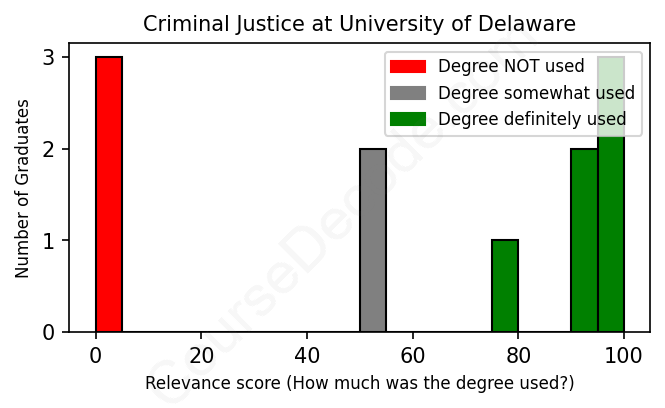
First, some facts. Of the Criminal Justice graduates from University of Delaware we've analyzed , here's how many have used (or NOT used) their degree in their career:

These are estimates based on AI analysis of 11 LinkedIn profiles (see below).
The verdict? Below average. Overall, with an average relevance score of 59%, Criminal Justice graduates from University of Delaware have a lower likelihood (-8%) of finding work in this field compared to the average graduate across all fields:
And for comparison, here's the chart for all profiles we've looked at across all degrees.
Also, after graduating, 36% of these graduates have pursued further education other than another Bachelor's degree (such as a Masters degree or other), compared to the average across all profiles of 35%. This suggests you may need more than just a Bachelors degree to be competitive as a Criminal Justice graduate.
See the details:
|
Relevance score: 50% We think this person has gone into a career only somewhat relevant to their degree. We think this person has gone into a career only somewhat relevant to their degree.
DEGREE INFOGraduated in 2021 from University of Delaware with a Bachelor of Arts and Science in Criminal Justice. No other secondary education since. JOB HISTORY SINCE GRADUATIONPrivate Captain & Fishing Guide Mash Partners LLC Oct 2021 - Nov 2022 ABOUTI am a University of Delaware class of 2021 graduate, with a Bachelors of Arts and Science in Criminal Justice with minors in Legal Studies and Sociology. Ive gained a vivid interest in studying law, predominantly criminal law, throughout my collegiate education. However, since graduating I have decided to pursue my passion of yachting and sportfishing all throughout the East Coast.During my time at UD, I gained the skill of interpreting research data and theories, as well as broadening my range in understanding multiple perspectives not only relating to my major, but in life as a whole. During my Sophomore year, I was elected into the role as Vice President of the Delta Tau Delta National Fraternity of the Delta Upsilon Chapter at UD. Following, at the start of 2020 in the midst of my Junior year, I was elected unanimously amongst my peers to become President of the chapter. Additionally, within my major, I was selected to work with and mentor 13 convicted felons at the Plummer Community Corrections Center in Wilmington, DE. Through these rigorous positions, I acquired and improved my skills in leadership, communication, time management, public speaking, delegating, financial management, and organization after holding such influential roles on campus.Starting in May of 2016, I was employed as a dockhand during my summer breaks. With a demonstrated history and knowledge of stationing myself within multiple fields of the maritime industry, after graduating from UD I worked closely with my summer employer to create the Dockmaster position. A position that was non-existent prior to May of 2021 at the marina. I obtained my USCG Captains Licenses senior year of college - OUPV with the Near Coastal Waters endorsement - and will soon upgrade to a 50 Ton Masters credential. Following my employment on the docks, I decided to further my career in becoming a full time captain for a private family. I was the sole operator and manager a fleet of vessels between Southampton, NY and Palm Beach, FL, including a 2020 Hinckley 43 Talaria, 2016 Contender 32ST, 2023 Boston Whaler 22 Dauntless, 2013 Boston Whaler 20 Dauntless, 2018 Yamaha VX Cruiser Deluxe, as well as 6 Lift electric hydro-foil boards. My day to day included luxurious boat days with various high-profile clients, water-sports, offshore & inshore recreational sportfishing, planning all vessels' service & dockage schedules, as well as maintaining the mechanical and physical components of each vessel.Feel free to contact me with any questions, or general inquires about my school or work experiences! |
The top 10 most common jobs done by the graduates we've analyzed (ranked most common to least) are:
When analyzing the job paths of people who graduated with a degree in Criminal Justice from the University of Delaware, it seems that there's a mix of roles, but the most common types of jobs tend to gravitate towards positions in legal settings, policy-making, and government. Many of these positions, such as legal interns, judicial interns, and various legislative roles, are highly relevant to the principles of criminal justice, effectively utilizing the knowledge and skills gained during their studies. Roles like Program Manager at a safety council or Executive Assistant to legislative leaders also show some connection, particularly when they involve aspects of safety regulation or policy development. These jobs may not be traditional criminal justice roles in law enforcement, but they still engage with the broader framework of the justice system.
On the flip side, there are a number of positions that are seemingly far removed from the field altogether. For example, roles like Sports Writer, Business Consultant, or even an Actor don’t tap into the core skills related to criminal justice. Overall, while there are significant job opportunities that directly relate to the degree, several graduates have ventured into fields that don't require that specialized knowledge, showing that a Criminal Justice degree can be quite versatile—even if it means some folks end up in roles that seem a bit out of left field! In conclusion, it appears that many graduates found a variety of jobs where their criminal justice knowledge was directly applied, but others also drifted into unrelated areas, highlighting the degree’s flexibility in career choices.
Here is a visual representation of the most common words in job titles for Criminal Justice graduates (this is across all Criminal Justice graduates we've analyzed, not just those who went to University of Delaware):

Looking at the career paths of graduates from the University of Delaware with a degree in Criminal Justice, it seems like many of them have started their careers with a mix of internships and entry-level positions that tie in well with what they studied. For instance, graduates from 2014 found themselves in roles like program managers and legislative aides, while others leveraged internships at entities like the U.S. Attorney's Office and the Federal Bureau of Prisons. It’s clear that the first job often relates to public service, legal internships, or law enforcement in some capacity, which is a solid start for a career in Criminal Justice.
As time goes on—about five to ten years after graduation—many of these individuals seem to continue ascending within either the legal field or government roles. For instance, some have transitioned from internships to full attorney positions, while others have taken on leadership roles within state departments. However, not every path leads directly to a Criminal Justice-related position; a few graduates have veered into completely different careers, like sports medicine consulting or stage management. So, while there are definitely success stories where graduates are thriving in their chosen fields, there’s also a noticeable diversity of career outcomes that may not always align closely with their degree. Overall, it's a mixed bag, but definitely a promising start for many.
Getting a Bachelor’s degree in Criminal Justice at the University of Delaware is pretty manageable for most students, especially if you’re genuinely interested in the subject. The coursework covers a good mix of topics like law enforcement, criminology, and the justice system, which can be engaging if you’re keen on those areas. While it's not a walk in the park, it’s also not considered one of the hardest degrees out there. Many students find it has a decent balance of reading, writing, and practical assignments that challenge you without feeling overwhelming. Just stay on top of your studies and participate in discussions, and you should do just fine!
Most commonly, in the LinkedIn profiles we've looked at, it takes people 4 years to finish a Bachelor degree in Criminal Justice.
Looking at the career paths of these Criminal Justice graduates from the University of Delaware, it seems like some are doing pretty well while others might be on the struggle bus. For instance, the grad who moved from legislative roles to becoming a Chief Policy Advisor is likely pulling in a solid salary, especially given the trajectory of their career. On the flip side, there are folks like the Property Maintenance Inspector and the Billing Clerk who probably aren't seeing as much in terms of pay. Overall, it’s a mixed bag—a few have landed roles that likely pay decent money, but several others are in jobs that might not offer much financial reward, which is pretty common in the criminal justice field. So, if you're thinking about this major, definitely keep in mind that your earning potential can vary a lot based on the specific job you land!
Here is a visual representation of the most common words seen in the "about" section of LinkedIn profiles who have a Bachelor degree in Criminal Justice (this is across all Criminal Justice graduates we've analyzed, not just those who went to University of Delaware). This may or may not be useful:

Here are all colleges offering a Bachelor degree in Criminal Justice (ordered by the average relevance score of their Criminal Justice graduates, best to worst) where we have analyzed at least 10 of their graduates: